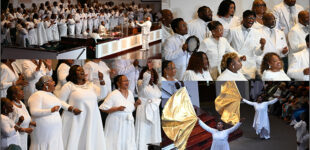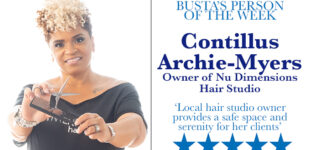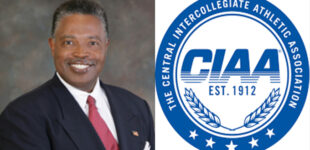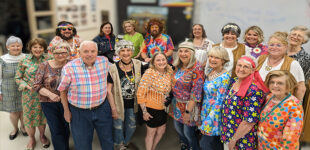‘This is Our Selma!’
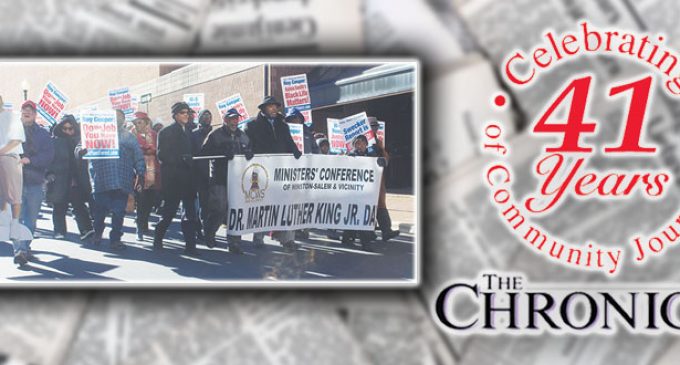
In above photo: Over 3,500 people from across the state and nation gathered in Winston-Salem on July 13 for the Mass Moral Monday March for Voting Rights. The march began at the Corpening Plaza and made its way to the federal courthouse, where marchers were joined by more protesters. (Photo by Tevin Stinson)
Historic Moral Monday march and rally draw thousands to Winston-Salem
By Tori Pittman AND Tevin Stinson For The Chronicle
On Monday, July 13, thousands of people came together at the Corpening Plaza on West First Street in Winston-Salem to participate in the Mass Moral Monday March for Voting Rights, as part of the Moral Monday movement.
People, in-state and out-of-state, came to witness what has been chanted throughout the crowd: ‘This is our Selma.’
The phrase refers to the moments in history before the Voting Rights Act was signed into law on Aug. 6, 1965.
This is a reference to the marches from Selma to Montgomery in Alabama, including on Bloody Sunday, that helped change votes in Congress from “no” to “yes” votes for the 1965 Voting Rights Act.
Estimates of the number of participants range from 3,500, according to the Winston-Salem Police Department, to more than 6,000, according to the N.C. NAACP, which is spearheading the Moral Monday protests.
The march and rally coincided with the start of the historic voting rights trial N.C. NAACP v. McCrory in the federal courthouse in Winston-Salem.
The plaintiffs say the voting law passed in North Carolina in 2013 is the worst voter suppression law in the country.
“Forward Together, Not One Step Back” was the theme of the march and rally, while various groups, such as Democracy N.C. and Veterans for Peace, were represented in the crowd. Religious organizations also were present in this rally.
Many signs were held up with sayings like “Voting Rights Now,” “50 Years After Selma,” “Voting Rights Still Matter,” “Voter Protection, Not Suppression,” and “Jim Crow Must Go.”
Before they marched, different groups came to the stage to pump up the crowd that was already in anticipation.
Prayers were made from the Rev. Jimmie Hawkins of Covenant Presbyterian Church, Rabbi Leah Citrin of Temple Beth Or and Imam Khalid Griggs of the Community Mosque of Winston-Salem.
The Rev. Lennox Yearwood, Hip Hop Caucus president, delivered a short message to the audience, especially to the younger generation, about exercising their right to vote.
At 5:15 p.m., the crowd officially began to march.
Protesters traveled from Second Street, to Cherry Street, on Fourth Street, to Main Street and back to Second Street.
Along the way, the marchers stopped in the front of the federal courthouse, where the Rev. Dr. William Barber II and other plaintiffs in the case joined the march that traveled back to Corpening Plaza.
But before they left the federal building, Barber and the plaintiffs held a press conference outside the federal courthouse.
Barber said more importantly than anything, he wants to see equal voter opportunities for all.
“We never heard about voter fraud until President Obama was elected,” Barber said. “We never said change the rules; we said abide by the rules. Even the claim of fraud is racist. It all goes back to one question: Why don’t they want us to vote?”
During the march, protesters voiced their opinions in a number of different ways, some held signs while others sang songs and chants that focused on voting rights, racial violence and the fight for economic justice.
Many of the protesters had to travel to attend the march.
A number of charter buses were parked behind the Corpening Plaza, many of which were filled with protesters of all ages and different backgrounds.
One of those who traveled by bus was Army veteran Bob Feldman. Feldman said the two-hour trip from Asheville was well worth it to make sure his voice was heard on this historic day.
“We drove about two hours to get here, but I had to be here. I didn’t want to miss this,” Feldman said. “If we aren’t heard, if we don’t speak out now, nothing will ever change.”
Feldman is a member of Veterans for Peace Chapter 99, which is in Asheville.
During the march and the rally, Feldman could be seen carrying a large American flag.
He said he brought the flag to show that we are all affected by voter suppression.
“We are all Americans and we are all affected by this law,” he said.
Earlier in the week, it was estimated that about 2,000 people would attend the march.
Judging by the crowd and photos, it is safe to say those estimatates were wrong.
As the march made its way through downtown Winston-Salem, protesters seemed to be multiplying.
Fay McCauley, a member of the N.C. NAACP, stayed at the plaza, but gave her reasons of why she attended the rally.
“I have always been taught from a young child that my vote is supposed to count, and that it’s a right that my fore-parents fought for and died for, and I can’t afford to give it up,” McCauley said.
McCauley, who worked at the voter polls and assisted those who turned 18 to register to vote, strongly opposes the voter ID law. She has also been deciding whether to continue to work at the polls.
“I have had to turn people away, against my will, because of the laws that have changed. How are you going to deny young people that are eligible to vote?”
Betty Dunn of Kansas, whose son Donald Dunn helped organize the march and rally, came down for support.
She was among those who marched with Dr. Martin Luther King Jr., and was now witnessing another march.
“He [Dr. King] said there will always be a time that we’re going to have to march,” said Dunn. “History repeats itself.”
By 6 p.m., the marchers returned, and more guest speakers gathered by the stage to speak to the rallying and supportive crowd.
Penda Hair, Advancement Project co-director, and Plaintiff Armenta Eaton gave a brief synopsis of the open statements made at the federal court hearing earlier that day.
“We had a great first day,” said Hair in reference to the court hearing. “This is a pivotal moment in North Carolina and United States history.”
Eaton brought her 94-year-old mother Rosanell Eaton, one of the lead Plaintiffs, who stood up before the audience as they cheered for her.
Moises Serrano of the N.C. American Friends Service Committee expressed that not only African-Americans are feeling voter suppression, but the Hispanic/Latino community is, too.
“Together we must work to dismantle the racist ideals that we inherited from our colonizers,” Serrano said.
J. David Cox, a North Carolina native and president of the American Federation of Government Employees, addressed the audience about working hard to continue to provide the people their Social Security funding, jobs and government assistance for those in need.
Rev. Dr. John Mendez, pastor of Emanuel Baptist Church in Winston-Salem introduced Barber to deliver the keynote address.
Barber gave his concerns about the H.B. 589, the 2013 voter law, and talked about how African-American leaders and ancestors in the past have fought so hard for voting rights and freedom.
“Everything that our fore-parents have fought for is under attack,” Barber said.
He said the 2013 law, which was passed without hesitation, was sinful.
“It’s time to call it what it is. It’s not merely political conservatism, it’s sin. It’s not merely right versus left, it’s sin. And our fore-parents knew what sin was. That’s why they went to church and marched, and got beaten on Bloody Sunday, to fight the sin.”
After Barber spoke, the Rev. Dr. T. Anthony Spearman of the N.C. NAACP read a letter that came from David Goodman, the brother of Andrew Goodman, one of the volunteers involved in the Freedom Summer project that was murdered on June 21, 1964. Volunteers James Chaney and Michael Schwerner also were murdered.
“Thank you all for your patriotic action to let all of America know, that Moral Monday is here to stay as long as necessary,” read the letter. “At 17 years old, I became witness to the hatred. It changed the course of my entire life, but the story of Goodman, Chaney and Schwerner is not my story. It’s the story of we the people. We the people can never be defeated.”
Goodman was 13 years old when his brother was murdered.
At the end of the rally, everyone joined hands as they sang along to the Oscar-winning song “Glory”, performed by Common and John Legend based on the soundtrack to the movie “Selma.”


